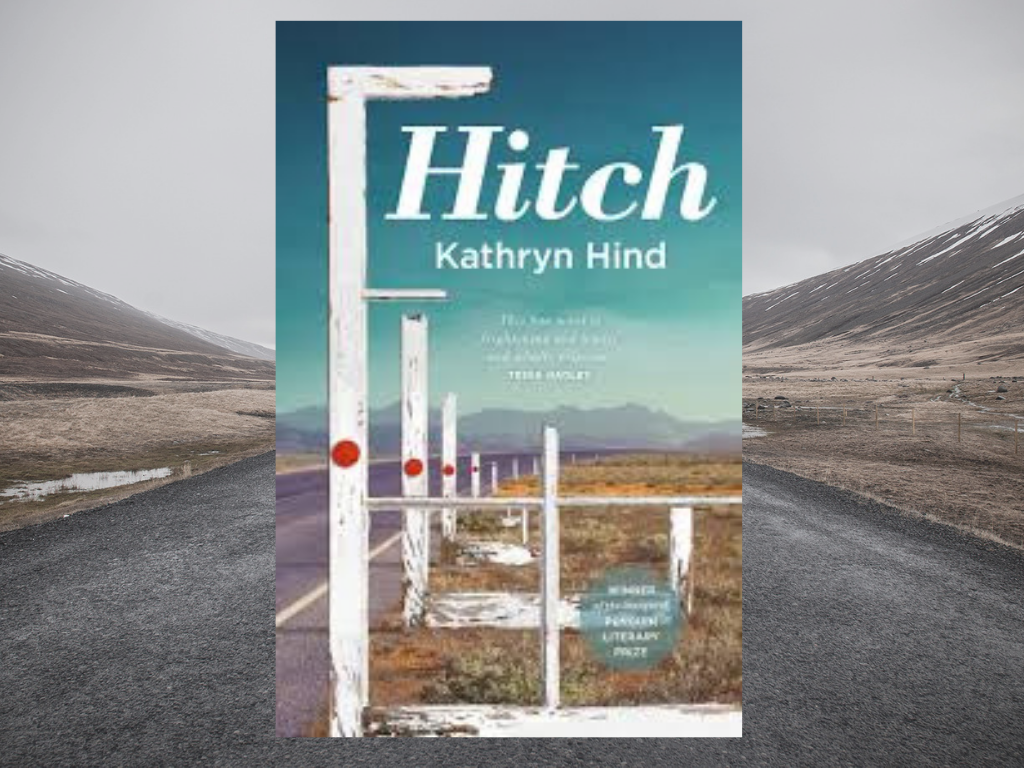
Canberra-based author Kathryn Hind‘s debut novel Hitch was published in June this year. The inaugural winner of the Penguin Literary Prize, Hitch tells the story of Amelia, a young woman of indeterminate age, who is hitchhiking her way to Melbourne. Her journey is an emotional one as well as a physical one, and throughout the book, there is a growing sense that Amelia is running away from something. Readers are given insight into what that something may be in dribs and drabs, as each of Amelia’s interactions with people along the way prompt her to share her memories with the reader, and allow them piece together a puzzle that reveals the extent of the damage that has been done to this young woman.
Though it was the death of Amelia’s mother that precipitated her story, the real trauma in Amelia’s past seems to be related to a relationship with a man named Zach. Zach and Amelia have previously had a relationship, and he has turned up at her mother’s funeral wanting to talk to her about the past. But, Amelia’s feelings about the past are complicated, and needing time and space to think, Amelia takes off on her journey across the desert, her only plan a very vague one to maybe visit her best friend Sid in Melbourne. The catch: Sid just happens to be Zach’s cousin, and doesn’t seem to know that Amelia doesn’t simply view Zach as her ex.
Each time Amelia is picked up by someone on the side of the road, a little more of her psyche is revealed, whether it be through the first flushes of attraction, which soon turn to fear when Amelia engages in a sexual interaction with the first driver we see, a man named Will, or through the discomfort she feels at the maternal attempts by a woman named Brenda to absorb Amelia into safety. The flashbacks Amelia sees are to her own 13 year old self– unformed and unsexualised, right at the moment when Zach began to turn his attention her way– through her afternoon spent swimming with a young girl named George. The short-lived comfort of a lift to a small town with a nurse and her teenaged daughter. And the outright terror of being abandoned on unfriendly property by a bearded man who drives her on the proviso that there be no questions asked.
These interactions are important, as in a nearly 250 page novel with no chapter breaks, there is very little dialogue and very little action. The story takes place mostly in the form of an interior monologue, third person perspective and limited to Amelia’s thoughts. Though she is accompanied by her dog, Lucy (and don’t worry, for all of those out there who dread novels with dogs as significant characters due to the high incidence of these four legged friends coming to some heartbreaking end, Lucy is okay throughout this book), Amelia is not warm and friendly, and does not offer much about herself even to Sid.
There are a number of oft-repeated motifs throughout the book, such as Amelia’s attempts to erase the smell of Will from her favourite t-shirt and her writing of postcards to Will in a code they invented as children. Amelia also has to contend with a number of difficult scenarios such as where she will sleep, how she will make her last hundred dollars last, and what to do when she gets her period out in the middle of nowhere.
Curiously, for a road trip novel, we know very little about where Amelia is running from. Later in the book, when she reaches Sid’s and takes stock of all the postcards she has sent him, we are given clues that she’s left Western Australia to reach him, but at earlier points in the novel, she refers to the East coast a lot, leaving me confused as to where she has actually run away from. Best I can surmise is that she returned to the West for the funeral but actually lived in Melbourne herself.
The trauma in this book is beautifully wrought, and not too heavy-handed, though it still may be triggering for some readers, but I can’t help but wonder if this is a short story that has been stretched into a novel. The interiority of it is at times slow and repetitive. The truth of what happens with Zach, and the hinted at possibility of a confrontation that may provide some closure, never eventuate.
This is a literary novel, however, and perhaps that is the point. The notion of Amelia as a survivor seems to be more important than the idea of healing, perhaps positing the idea that some wounds cannot be healed, even if a person can learn to live with them. I cannot make up my mind if the novel needed to be expanded upon, to answer more of my questions, or shortened, to have more of an impact.
What Hind does extremely well is characterisation, with each of her road trip companions entering and leaving the scene fully formed as if actors doing bit parts in a play. The kindness of strangers, and Amelia’s (perhaps founded) unwillingness to trust provide fertile ground for a richness of human interaction on the page.
We don’t see Amelia’s whole journey, and join her just before she reaches South Australia, which is perhaps a blessing, as too many more car rides might have been a repetition too far for this reader. Not to say that this is not an enjoyable read, but it is a sombre one, and due to the absence of chapter breaks, not the best light reading for right before bed. It is at times a deeply uncomfortable read, though that is exactly what Hind was aiming for I think, and so I must commend her for that.
![]()
![]()
![]()
![]()
![]()
THREE STARS (OUT OF FIVE)
Kathryn Hind’s Hitch is available now through Penguin.
